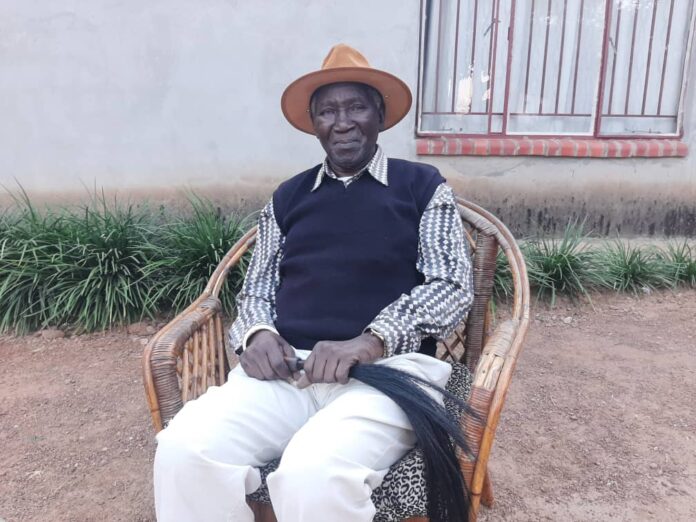By Charles Mafa
Paul Lubunga stood outside his palace in Chembe, a remote part of Lufwanyama district about 13 kilometres from Kalulushi town, casually chatting with one of his indunas. The late afternoon sun cast a warm glow across the quiet landscape of Lubunga Village. Despite the calm scene, behind Lubanga’s composed demeanor lies a two-decade-long struggle for justice, identity, and rightful leadership.
On April 19, 2024, Lubunga was installed as Chief Nkana the eighth (VIII), ending a 23-year succession dispute that fractured the Nkana Royal Establishment and divided communities. His installation in line with the Lamba customs, was facilitated by Senior Chieftainess Mushili, and was backed by a court ruling.
While the Zambian government officially recognises Mushili as a senior chief, the Lamba people regard her as the paramount chief of all Lambas in both Zambia and the Democratic Republic of Congo (DRC). According to traditional hierarchy, Chief Nkana ranks directly below Chief Mushili.
Yet, despite his formal installation in 2024, Chief Nkana’s victory remains incomplete.
“We performed all the necessary procedures as guided by Senior Chief Mushili. Once the selection was done, I underwent the traditional ritual known as Kampolo, where I was taught all the necessary rules — the dos and don’ts of being a chief. After that, I was formally presented to the public as their new chief, with the declaration that from that moment onwards, I would be their leader,” he explained in an interview with MakanDay at his home in Kalulushi.
Despite recognition under both tradition and law, Lubunga is denied the full rights and benefits of his chieftaincy by the government — including a salary, an official residence, and the authority to preside over traditional and administrative matters in his chiefdom.
According to the Constitutional Court of Zambia’s ruling in Webby Mulubisha vs Attorney General delivered on 27 November 2019, Sections 3 to 7(2) of the Chiefs Act (Chapter 287 of the Laws of Zambia) on the recognition of chiefs were found to be inconsistent with Article 165 of the Constitution of Zambia (Amendment) Act No. 2 of 2016. The Court held that Article 165 prohibits any legislation from regulating the institution of chieftaincy, rendering the cited provisions unconstitutional.
At stake also is the future of the chiefdom, located in Lufwanyama in Zambia’s Copperbelt Province—home to Kagem, the world’s largest emerald mine. Kagem produces roughly a quarter of the world’s rough emeralds, employs close to 1,600 people, and is 25% owned by Zambia’s state-run Industrial Development Corporation.
In previous reports, we highlighted that in a November 2024 investor update, Gemfields stated the mine has contributed US$195.1 million to the Zambian treasury in taxes, royalties, and dividends since 2008.
The succession dispute began in 1999, following the death of the previous chief, Senior Chief Nkana, Mr. Mutupa. Tensions escalated in 2022 when Godfrey Shamanena controversially declared himself Chief Nkana, prompting a renewed round of legal battles.
Backed by many in the royal family, Lubunga challenged Shamanena’s claim and fought a long, costly court fight to reclaim what he says is his ancestral role.
While the throne has been restored through tradition and law, Chief Nkana VIII’s authority remains in limbo—still awaiting official government recognition.
In its ruling, the High Court found that Shamanena’s appointment had violated Lamba customs. The court declared that, until a rightful chief was installed, the Nkana throne remained vacant.
Under Lamba tradition, the Abena Mbushi are custodians responsible for installing a chief from the Abena Mashishi clan.
According to minutes from the selection meeting held at St. Joseph Mission and reviewed by MakanDay, Lubanga was nominated by three royal families—Lubunga, Chifutula, and Kabende. His nomination was later ratified and confirmed by the Abena Mashishi male elders. The installation ceremony took place on April 19, 2024.
Records seen by MakanDay show that in 2022, Lubanga had already been unanimously selected by the queen mothers. However, that process was disrupted when Shamanena installed himself without following established traditional procedures.
When the royal families rejected him as their rightful chief, Shamanena took them to court for interference. On December 14, 2012, the High Court ruled against him, declaring that he was not the legitimate Chief Nkana and that the throne remained vacant.
In a later twist, during a second succession process, Shamanena again claimed the throne—this time fraudulently. The royal families returned to court, and on January 13, 2023, following the High Court ruling, Senior Chieftainess Mushili convened all royal families.
Lubunga was, for the third time, unanimously selected as Chief Nkana.
Now, despite community support, court validation, and traditional installation, Chief Nkana VIII continues to wait—his leadership recognised by his people, yet ignored by the state.
“To me, I represent the head of the Lamba tribe, and to the people of Chief Nkana, I am a symbol of wisdom and order in the chiefdom,” said Chief Nkana.
The Ministry of Local Government and Rural Development, which oversees traditional leadership in Zambia, has yet to respond to MakanDay’s request for comment on the matter.
One of the paragraphs in the story has been amended to read: Despite recognition under both tradition and law, Lubunga is denied the full rights and benefits of his chieftaincy by the government — including a salary, an official residence, and the authority to preside over traditional and administrative matters in his chiefdom.

Discover more from MAKANDAY
Subscribe to get the latest posts sent to your email.



